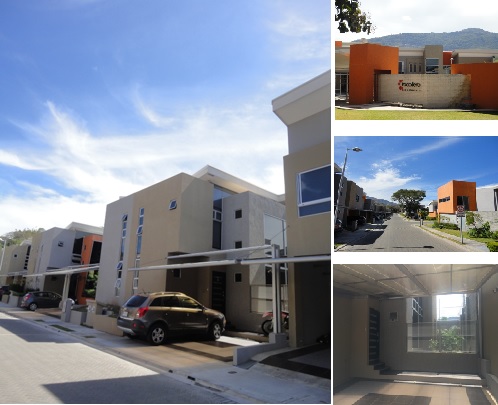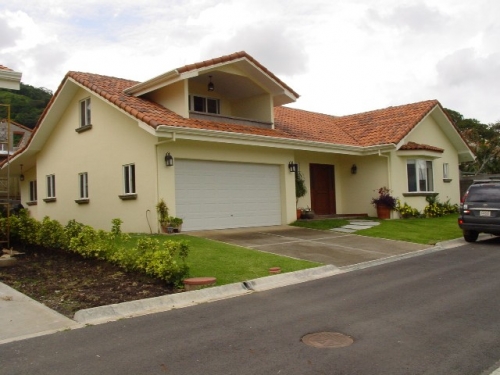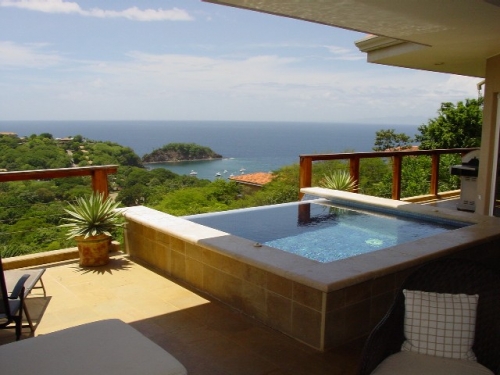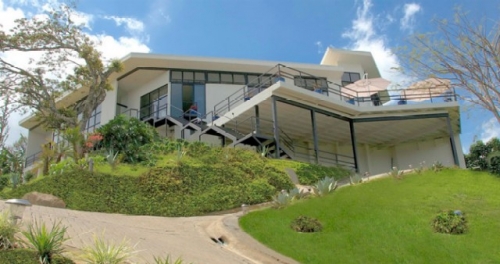Costa Rica Guide
Costa Rica Real Estate
List your property today!
Inclusion of real estate listings at Costa Rica Guide is
absolutely free of charge.
Featured Properties
Costa Rica Guide - Costa Rica Real Estate
A home away from home
With the price of prime Canadian real estate soaring, more people are going abroad to buy vacation property. But beware, there could be trouble in paradise
By Kate McNamara
Financial Post
August 21, 2006
Darryl Stanier admits he was a little nervous when he wired US$45,000 to a Mexican bank account to secure the strip of beachfront property on the Pacific coast he and his wife, Sarita, fell in love with on their holiday. "This was the account of a Mexican contact's wife, for whom I had no fixed address," recalls the 39-year-old Calgary businessman.
Buying waterfront property in Mexico is not for the faint of heart. Among the biggest hurdles is the country's constitution, which bars foreigners from owning coastal land. There are, however, ways to circumvent the law.
Mr. Stanier entered a "business association" with a local resident to make the purchase, which set him back more than US$250,000.
A foreign-controlled Mexican corporation can also own the property. Alternately, foreigners can hold costal property that is federally titled through a bank trust with a 50-year term. The bank holds legal title to the property, but the buyer is the beneficiary and may use the property.
Mr. Stanier hopes to build quickly on his land, aiming to vacation there with his family and rent it out as a holiday home. He also sees the opportunity to set up a business investing in Mexican real estate and helping other Canadians access the market.
"There's a lot of demand in Canada for this sort of property. But people hold back because they don't know the law or the language and they don't know who to trust."
Despite the difficulties, Canadians are increasingly venturing into real estate markets beyond the borders and those of the United States.
Statistics Canada doesn't track property purchases outside the country, though the agency reports that a record 6.2 million Canadians travelled abroad (to destinations other than the United States) in 2005, spending a record $9.4-billion. The United Kingdom was the most popular destination, followed by Mexico and France.
Property purchases are an important chunk of that spending, says Lawrence Barker, executive director of the Canadian Snowbirds Association, which represents some 70,000 members, generally retirees, who spend up to six months annually living outside the country.
Karina Nemanic, a real estate agent for Century 21 in Panama City, says Canadians are increasingly shopping for real estate all over Central America.
"They are looking to go south, and Florida is getting very expensive," says Ms. Nemanic. In Panama, as little as US$80,000 will buy you an apartment in a pleasant part of Panama City, close to restaurants and nightlife, while US$1.5-million will get you an opulent beachfront property less than an hour's drive from the city.
Canadians, she says, account for a rapidly rising proportion of the foreigners -- traditionally Americans, Germans, Italians and Columbians -- who invest in real estate in the country. One reason is buying power.
The loonie has recently risen from a low of US$0.61 in 2002, to close to US$0.90. That has made property, generally priced in U.S. dollars throughout Mexico, Central America and much of the Caribbean, increasingly affordable.
For decades, Costa Rica has proven the most popular Central American country for Canadian property buyers. A major reason is the country's longstanding political stability. During the 1980s, when Panama to the south fell under military dictatorship, and Nicaragua to the north was engulfed by civil war, Costa Rica had already abolished its army and its president Oscar Arias was awarded a Nobel Peace Prize.
"Even in the 1980s, foreigners saw Costa Rica as a stable place to invest money, buy a second home and even retire," says San Jose-based real estate agent Mark Jackson, who moved there from Toronto in 1987.
The recent arrival in Costa Rica of Stewart Title Insurance -- insurance against unforeseen property title limitations -- and a state-of-the-art system for title registration, gives foreigners added security when investing in property in the Central American country.
Pitfalls, however, remain. As in most Latin American and Caribbean countries, Costa Rica requires no formal training of real estate agents, and there are no laws or industry bodies to prevent agents from promoting sales in which they may have an undisclosed interest. "Anyone, including the friendly taxi driver you just met, can set himself up as a broker," cautions Mr. Jackson.
Investors must also negotiate their way through the maze of local bureaucracies. "I had a client lose his shirt in the Dominican Republic," says Toronto real estate lawyer Bob Aaron. He bought an oceanfront property on which he proposed to build a small condo development -- 10 or 15 units. It turned into a nightmare of red tape and, eventually, it went bust."
Mr. Aaron is also powerless to help clients who put money into foreign property -- recognition of his legal qualifications ends at the Ontario border.
Canada's Department of Foreign Affairs also warns that throughout Latin America and the Caribbean, regulations governing conflicts of interest by lawyers are likely to be much less stringent than they are in Canada. And investors relying on developers can encounter myriad hiccups.
But such hazards are not limited to the developing world. Europe is less popular with Canadians who buy abroad because of the added expense of higher currency conversion costs, steeper airfares and sometimes tighter visa restrictions. However, those with birth or ancestral ties to European countries often return to invest.
Buyers snapping up property in developed countries shouldn't be lulled into a false sense of security, warns John Howell, principal at John Howell & Co., a London-based legal firm, which specializes in property purchases on the continent. Buyers need to make sure they can obtain the proper permits and licences -- before they buy.
Earlier this year, a group of Spaniards, including a town mayor, were arrested in connection with a corruption scheme that centred on some 30,000 properties in the popular Spanish destination of Marbella. It is alleged the properties were illegally built and as many as 4,500 of the homes may be demolished.
But compared with the costs of purchasing recreational property at home, Canadians are increasingly willing to take such risks as they search for bargains further afield.
Beyond his oceanfront lot, Mr. Stanier can see large parcels of land with lovely sea views selling for tens of thousands rather than hundreds of thousands of dollars.
"Where can you get that at home?" he wonders.
And in a few years, he wagers, you won't be able to get that in Mexico, either.
© National Post 2006
Note: The above information is not to be used for any other purpose other than private study, research, criticism or review. Thank you.






